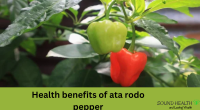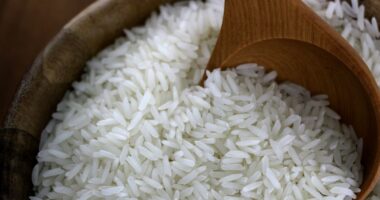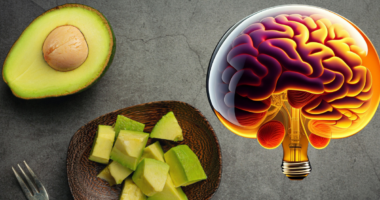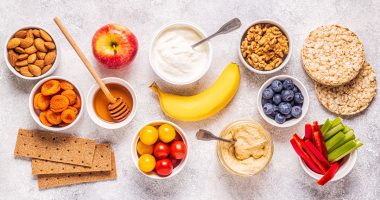Living with Psoriasis can be a challenging experience, both physically and emotionally. Researchers from JAMA Dermatol recommended dietary changes are important to cope with psoriasis, hence, this 7-day diet plan.
Psoriasis is a chronic, autoimmune skin condition that can significantly impact a person’s quality of life. While it may not be life-threatening, the physical and emotional toll of this disease should not be underestimated.
The most typical symptom of psoriasis is the rapid buildup of skin cells, leading to the formation of red, scaly, inflamed patches on the skin. These patches can appear anywhere on the body and can be itchy, painful, and unsightly. In some cases, the skin may crack and bleed, causing further discomfort and increasing the risk of infection. Psoriasis often appears in early adulthood and can affect people of any age, sex, or race.
Beyond the physical symptoms, psoriasis can also take a toll on a person’s mental and emotional well-being. The visible nature of the condition can lead to feelings of self-consciousness, embarrassment, and social isolation. The constant need to manage flare-ups and the unpredictable nature of the disease can also contribute to stress, anxiety, and depression.
Psoriasis can also have a significant impact on a person’s daily life. Severe cases may make it difficult to sleep, exercise, or perform everyday tasks. In some cases, the condition may even interfere with a person’s ability to work or participate in social activities, says a report by the National Institute of Arthritis and Musculoskeletal and Skin Diseases.
Despite the challenges, it’s important to remember that psoriasis is a manageable condition. While there is no cure, there are many effective things you can combine with available treatments that can help control symptoms and reduce the frequency and severity of flare-ups. The top on the list of things you can do is diet changes with the help of a diet plan. ‘Why is a diet plan important?’ you ask.
Reason Psoriasis Diet Plan Is Important
If you’re living with psoriasis, you may have noticed that your diet can have a significant impact on your symptoms. The foods you eat can either help soothe your skin or trigger flare-ups. That’s why creating a personalized psoriasis diet plan is so important.
Nature’s research suggests that certain dietary factors can influence the body’s inflammatory response. Some foods are rich in vitamins, minerals, and antioxidants that can help calm inflammation, while others may exacerbate it.
Many psoriasis patients report that adjusting their diet has helped improve their skin. By identifying and avoiding trigger foods, and incorporating more skin-friendly nutrients, they’ve been able to better manage their condition.
In a world where conventional treatments don’t always provide the relief we seek, more and more psoriasis sufferers are turning to natural solutions and nutrition is often at the forefront of this approach.
Creating a personalized psoriasis diet plan can be empowering. It allows you to take an active role in your health and potentially reduce your reliance on medications. Plus, the prospect of seeing tangible improvements in your skin can be highly motivating.
Of course, it’s important to remember that making drastic dietary or lifestyle changes should always be done in consultation with your healthcare provider. They can help you navigate the complexities of your condition and ensure that any adjustments you make are safe and effective.
If you or someone you know is living with psoriasis, it’s important to remember that making dietary or lifestyle changes should always be done in consultation with your healthcare provider. This is to help tailor to individual patient’s needs, comorbidities, and medications. Eating right will help you manage the condition and live a full, and healthy life.
Foods to Embrace for Psoriasis Management
International Journal of Molecular Sciences and Nutrients shared some Nutrition facts for managing psoriasis condition.
- Fruits: Berries, cherries, tomatoes, grapes, oranges, and other citrus fruits are high in vitamin C and flavonoids
- Antioxidants Rich Vegetables: Broccoli, Brussels sprouts, leafy greens, onions Asparagus, garlic, onions, sweet potatoes
- Fatty Fish: Salmon, sardines, tuna and mackerel
- Nuts and Seeds: Almonds, cashews, chia seeds, flaxseeds and walnuts
- Prebiotic Foods: apples, bananas, berries, kiwifruit
- Legumes: Beans, lentils, peas
- Healthy Oils: olive, flaxseed, and vegetable oils
- Complex carbohydrates like whole grains whole-grain breads, cereals, pastas, brown or wild rice
- Dietary fiber
- Fiber fermentation in the gut produces short-chain fatty acids (SCFAs)
7-day psoriasis diet
Day 1
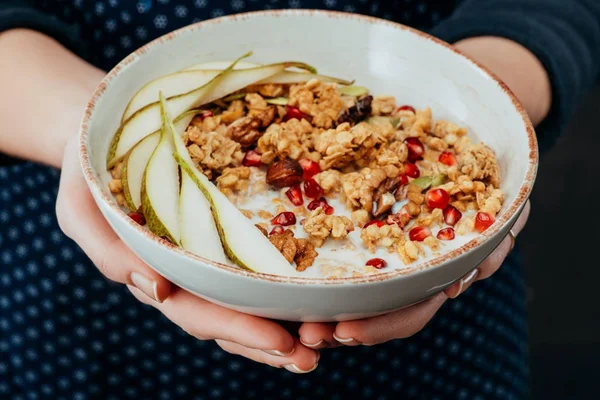
Breakfast: Kickstart your day with a wholesome and nutritious breakfast like oatmeal topped with berries, nuts, and a drizzle of honey. Oatmeal provides sustained energy from complex carbohydrates, while berries offer antioxidants and fiber, and nuts add healthy fats and protein.
Lunch: For lunch, opt for a refreshing salad with grilled chicken or fish as your protein source. Include a variety of colorful vegetables, such as leafy greens, bell peppers, and carrots, to boost your intake of vitamins and minerals.
Dinner: Indulge in a flavorful and nutritious dinner of grilled salmon paired with roasted vegetables. Salmon is an excellent source of omega-3 fatty acids, which have anti-inflammatory properties that may help alleviate psoriasis symptoms. Roasted vegetables, such as broccoli, asparagus, and zucchini, provide essential vitamins, fiber, and antioxidants.
Snacks: Throughout the day, replenish your energy with healthy snacks like fruits, vegetables, nuts, and seeds. Fruits provide natural sweetness and essential vitamins, while vegetables offer fiber and nutrients. Nuts and seeds are packed with healthy fats, protein, and fiber.
Day 2

Breakfast: Blend up a nutrient-rich smoothie made with fruits, vegetables, and yogurt. Choose fruits with anti-inflammatory properties, such as berries and bananas. Include leafy greens like spinach or kale for a boost of vitamins and minerals. Yogurt provides protein and probiotics, which can aid gut health.
Lunch: Enjoy a hearty and satisfying quinoa bowl filled with beans, vegetables, and avocado. Quinoa is a complete protein source and provides complex carbohydrates for sustained energy. Beans add fiber and protein, while vegetables offer essential vitamins and minerals. Avocado contributes healthy fats and fiber.
Dinner: Warm up with a comforting bowl of turkey chili. Turkey chili provides lean protein and fiber, while the addition of beans, vegetables, and spices creates a flavorful and nutritious meal.
Snacks: Keep your energy levels consistent with healthy snacks like fruits, vegetables, nuts, and seeds. Apples, oranges, and berries are excellent choices for fruits. Carrot sticks, celery stalks, and bell pepper slices are refreshing vegetable options. Nuts and seeds provide healthy fats, protein, and fiber.
Day 3

Breakfast: Start your day with a protein-packed breakfast of eggs served with whole-wheat toast. Eggs are a versatile source of protein and essential nutrients, while whole-wheat toast provides complex carbohydrates and fiber.
Lunch: Nourish your body with a hearty and flavorful lentil soup. Lentils are a plant-based protein source rich in fiber and essential nutrients. The addition of vegetables and spices enhances the soup’s flavor and nutritional value.
Dinner: Delight in a delicious and nutritious chicken stir-fry with an assortment of vegetables. Chicken provides lean protein, while the stir-fry technique allows for minimal oil use, promoting heart health. Choose a variety of colorful vegetables to boost your intake of vitamins and antioxidants.
Snacks: Choose healthy snacks like fruits, vegetables, nuts, and seeds to maintain stable energy levels throughout the day. Grapes, strawberries, and kiwis are excellent choices for fruits. Cucumber sticks, cherry tomatoes, and sugar snap peas are refreshing vegetable options. Nuts and seeds provide healthy fats, protein, and fiber.
Day 4
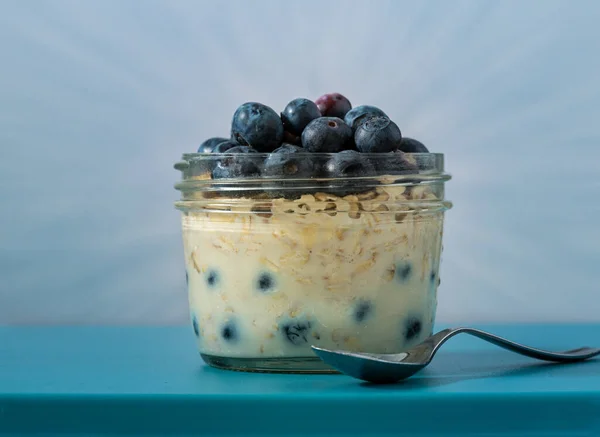
Breakfast: Indulge in a wholesome and refreshing breakfast of overnight oats with chia seeds and fruit. Overnight oats provide sustained energy from complex carbohydrates, while chia seeds add protein, fiber, and omega-3 fatty acids. Fruits offer natural sweetness, vitamins, and antioxidants.
- Lunch: Tuna salad sandwich on whole-grain bread with avocado, lettuce, tomato, and a side of carrot sticks. Tuna is a good source of protein and vitamin D, both of which are important for skin health. Avocado is a good source of monounsaturated fats, which can help reduce inflammation. Lettuce and tomato are both good sources of vitamins and minerals. Carrot sticks are a good source of beta-carotene, which can help boost your immune system.
- Dinner: Grilled shrimp skewers with roasted sweet potatoes and Brussels sprouts. Shrimp is a good source of protein and zinc, both of which are important for skin health. Sweet potatoes are a good source of vitamin A, which can help protect your skin from damage. Brussels sprouts are a good source of fiber, which can help promote gut health.
- Snack: Greek yogurt with granola and a drizzle of honey. Greek yogurt is a good source of protein and calcium, both of which are important for bone health. Granola is a good source of fiber and nuts, which can help reduce inflammation. Honey is a natural sweetener that is also antibacterial.
Day 5

Breakfast: Fuel your body with a nutrient-rich breakfast of avocado toast topped with poached eggs. Avocado provides healthy fats, fiber, and antioxidants, while poached eggs offer lean protein and vitamins. Whole-grain toast adds complex carbohydrates and fiber.
Lunch: Savor a flavorful and satisfying lentil stew with crusty whole-grain bread. Lentil stew provides plant-based protein, fiber, and essential nutrients. The addition of vegetables and spices creates a hearty and nutritious meal. Whole-grain bread offers complex carbohydrates and fiber.
Dinner: Indulge in a delicious and nutritious baked cod with roasted vegetables. Cod is a lean protein source rich in omega-3 fatty acids, while roasted vegetables, such as Brussels sprouts, sweet potatoes, and carrots, provide essential vitamins, fiber, and antioxidants.
Snacks: Choose healthy snacks like fruits, vegetables, nuts, and seeds to maintain stable energy levels throughout the day. Mangoes, pineapples, and papayas are excellent choices for fruits. Edamame, hummus, and roasted chickpeas are protein-rich vegetable options. Nuts and seeds provide healthy fats, protein, and fiber.
Day 6
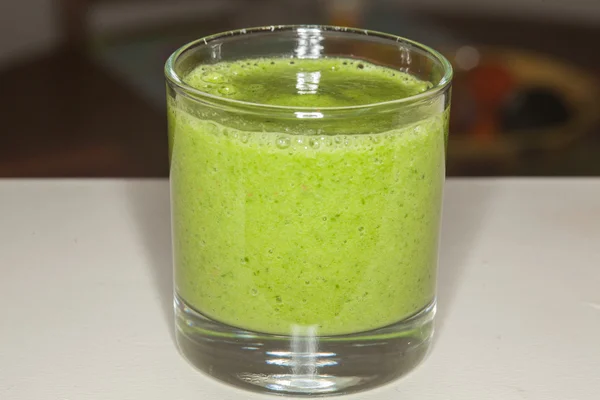
Breakfast: Smoothies made with spinach, banana, almond milk, and protein powder. This nutrient-packed smoothie provides a balanced start to your day. Spinach is rich in vitamins and minerals, while bananas contribute potassium and fiber. Almond milk offers a dairy-free alternative, and protein powder ensures adequate protein intake for muscle maintenance and repair.
Lunch: Lentil soup with a side of whole-grain bread. Lentil soup is an excellent source of plant-based protein and fiber, both of which contribute to satiety and overall gut health. Whole-grain bread provides additional fiber and complex carbohydrates for sustained energy levels.
Dinner: Tofu stir-fry with vegetables like broccoli, carrots, and bell peppers, served over brown rice. Tofu is a versatile protein source that readily absorbs flavors, making it ideal for stir-fries. Broccoli, carrots, and bell peppers add a medley of vitamins, minerals, and antioxidants to the dish. Brown rice provides a whole-grain base with fiber and complex carbohydrates.
Snacks: Greek yogurt with berries and a sprinkle of cinnamon. Greek yogurt is a protein-rich snack that delivers beneficial probiotics for gut health. Berries offer a burst of sweetness, fiber, and antioxidants. Cinnamon adds a touch of warmth and has anti-inflammatory properties.
Day 7

Breakfast: Scrambled eggs with spinach, mushrooms, and whole-wheat toast. Eggs are a good source of protein and choline, both of which are important for brain health. Spinach is a good source of vitamins A, C, and K, as well as iron and folate. Mushrooms are a good source of antioxidants, which can help protect your cells from damage. Whole-wheat toast is a good source of fiber, which can help promote gut health. [Image of Salad with chickpeas, feta cheese, cucumber, olives, and a lemon-tahini dressing]
Lunch: Salad with chickpeas, feta cheese, cucumber, olives, and a lemon-tahini dressing. Chickpeas are a good source of protein and fiber, both of which are important for satiety. Feta cheese is a good source of calcium, which is important for bone health. Cucumber is a good source of water and electrolytes, which can help you stay hydrated. Olives are a good source of monounsaturated fats, which can help reduce inflammation. Lemon-tahini dressing is a flavorful and healthy way to add some zing to your salad.
Dinner: Grilled shrimp skewers with roasted sweet potatoes and Brussels sprouts. Shrimp is a good source of protein and selenium, both of which are important for immune function. Sweet potatoes are a good source of vitamin A, which can help protect your skin from damage. Brussels sprouts are a good source of fiber and vitamins C and K.
Snacks: A handful of walnuts and a pear. Walnuts are a good source of omega-3 fatty acids, which are anti-inflammatory. Pears are a good source of fiber and vitamin C.
This is just a sample plan, and you may need to make adjustments based on your individual needs and preferences. Be sure to talk to your doctor or a registered dietitian before making any major changes to your diet.
Additional Lifestyle Factors for Psoriasis Management
In addition to dietary modifications, several lifestyle factors can contribute to managing psoriasis and preventing flare-ups:
Regular exercise: Aim for at least 30 minutes of moderate-intensity exercise most days of the week. Exercise has anti-inflammatory effects and can help improve overall health and well-being.
Stress management: Stress can trigger psoriasis flare-ups. Find healthy ways to manage stress, such as yoga, meditation, or spending time in nature.
Maintain a healthy weight: Obesity is associated with an increased risk of psoriasis and can worsen symptoms. Maintaining a healthy weight can help reduce inflammation and improve overall health.
Adequate sleep: Aim for 7-8 hours of quality sleep each night. Sleep deprivation can worsen psoriasis symptoms.
Sun exposure: Moderate sun exposure can help improve psoriasis symptoms. However, it is important to avoid excessive sun exposure, which can damage skin and increase the risk of skin cancer.
- Drink plenty of water throughout the day. Staying hydrated can help flush out toxins and keep your skin healthy.
Avoid Triggers
Limit or avoid foods that can trigger or exacerbate psoriasis symptoms, such as:
- Alcohol: Avoid excessive alcohol consumption, as it can worsen psoriasis symptoms.
- Animal Fats: Limit or avoid saturated and trans fats from animal sources.
- Red Meat: Limit or avoid red meat consumption, as it can be high in saturated fats and pro-inflammatory compounds.
- Simple Sugars: Limit or avoid simple sugars and refined carbohydrates, which can cause blood sugar spikes and inflammation.
- Highly Processed Foods: Avoid highly processed foods, which are often high in unhealthy fats, added sugars, and sodium, according to Nutrients report.
Note: It is important to note that these are general recommendations, and individual needs may vary. Consult with your doctor or a registered dietitian to develop a personalized plan that is tailored to your specific needs and preferences. They can provide guidance on dietary modifications and lifestyle factors that may be beneficial for managing psoriasis and improving overall health.
Note: This article is written based on scientific evidence found by the soundhealthandlastingwealth.com team. Sources are duly referenced and hyperlinked to source websites and are clickable for confirmation.

